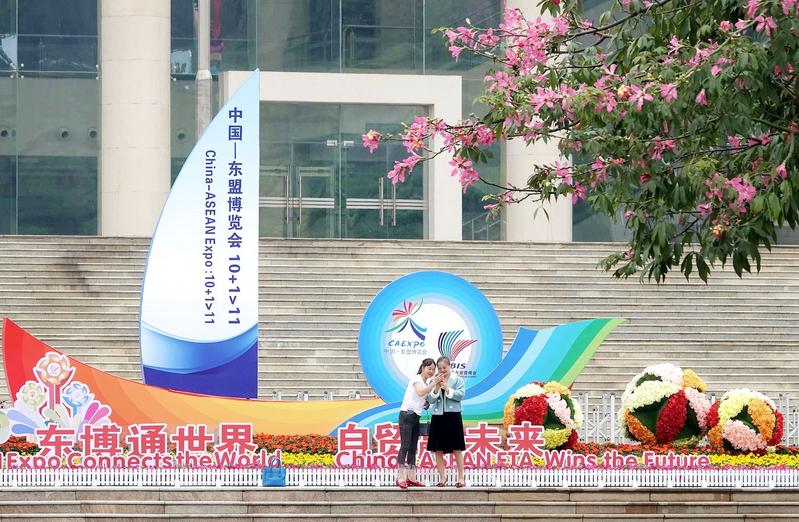 In this undated file photo, pedestrians take photographs of a decoration for the 17th China-ASEAN Expo in Nanning, capital of the Guangxi Zhuang autonomous region. (YU XIANGQUAN / CHINA DAILY)
In this undated file photo, pedestrians take photographs of a decoration for the 17th China-ASEAN Expo in Nanning, capital of the Guangxi Zhuang autonomous region. (YU XIANGQUAN / CHINA DAILY)
Experts hail relationship between regional partners that benefits all
Continued strengthening ties between China and the Association of Southeast Asian Nations augur well for an even stronger partnership in the future, analysts say.
The China-ASEAN relationship has grown into the most successful and vibrant model for cooperation in the Asia-Pacific and an exemplary effort in building a community with a shared future for mankind.
Xi Jinping, Chinese president
At the opening ceremony of the 17th China-ASEAN Expo and China ASEAN Business and Investment Summit in Nanning on Friday, President Xi Jinping said the two sides enjoy growing connectivity, deepening economic integration, robust business ties and closer people-to-people exchanges.
ALSO READ: Xi's remarks at expo point to growing China-ASEAN bond
ASEAN itself is a community grouping Brunei Darussalam, Cambodia, Indonesia, Lao PDR, Malaysia, Myanmar, the Philippines, Singapore, Thailand and Vietnam. The group and China have continuously built trade and economic partnership over the years, said Suthiphand Chirathivat, executive director of the ASEAN Studies Center at Chulalongkorn University and executive director of Thai conglomerate Central Group.
In his virtual address, Xi said: "The China-ASEAN relationship has grown into the most successful and vibrant model for cooperation in the Asia-Pacific and an exemplary effort in building a community with a shared future for mankind."
Xi's address "was a reiteration of Chinese commitment toward regional cooperation, development, and prosperity", said Nawazish Mirza, associate professor of finance at Excelia Business School in France.
Trade flow, easy market access to regional investors and integration of industrial supply chains will remain the backbone of collaborative development.
"Overall, these collaborative efforts will be instrumental toward a shared future of humanity," Mizra said.
On Xi citing ASEAN as a key region in high-quality Belt and Road collaboration in his speech, Chin Yew Sin, adviser for the Asia-Pacific region of the Global One Belt One Road Association, said ASEAN countries have been working with China as part of the Belt and Road Initiative.
China can also benefit from a more developed ASEAN because as these countries develop, their demand for goods and technologies from China will also increase, Chin said.
ALSO READ: Xi calls for closer China-ASEAN ties
"I foresee China and ASEAN countries will become mutually dependent on each other. Their bond will become lasting and mutually beneficial."
Referring to Xi highlighting the need to focus on stimulating the digital economy, which will be a catalyst for future growth, Mirza said: "Technological cooperation is an essential aspect of the Belt and Road Initiative that will promote digitalization and lead to sustainable development."
Chin said the digital economy will be important after the pandemic as technologies such as 5G, artificial intelligence and blockchain can help a country develop faster.
Malaysia, in developing its digital economy, is working closely with China, he said.
Iris Pang, chief economist for Greater China for the Dutch investment bank ING, also pointed to Xi highlighting technology connectivity. ASEAN and the Belt and Road in general could be a large export market for China's technology, Pang said.
The president's reassurance of continuous support of ASEAN in combating COVID-19 was also welcomed. When China's COVID-19 vaccines are available for use it will "consider the needs of ASEAN countries", and the country will provide financial support to the COVID-19 ASEAN Response Fund, he said.
READ MORE: RCEP - a milestone in Asian economic integration
Pang said the vaccine's reliability and side-effects concern recipient countries.
"I believe China knows this well and will try to provide a vaccine with effective protection and minimal side effects."
China's support "will be vital for other regional countries in improving public health capacity", Mirza said.
"COVID-19 has proved to us how fragile it could be in terms of the interconnectivity of our world, despite the progress we made about globalization before," Suthiphand said.
"In order to get back on track again on globalization, we need global governance and better international order. China has already shown support (for globalization), and I hope China can continue to make that kind of opening and (match) the words with action."
The recently signed Regional Comprehensive Economic Partnership, the world's biggest free trade pact, is a proving ground for the new regional order and global partnership, Suthiphand said. "We should support it. People should not see RCEP as a China-backed initiative," he said, adding that the deal will benefit everyone.
READ MORE: Full text: Xi's remarks at opening ceremony of China-ASEAN Expo
Ho Meng Kit, chief executive of the Singapore Business Federation, said: "The signing of RCEP can further increase trade and investment flows between China and ASEAN."
China is ASEAN's largest trading partner and the top source of imports for many ASEAN countries, he said.


